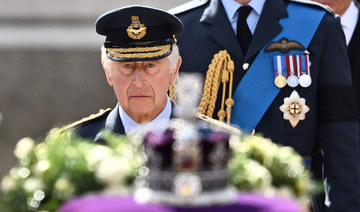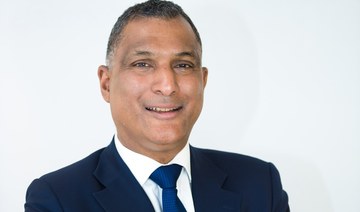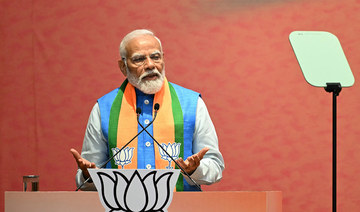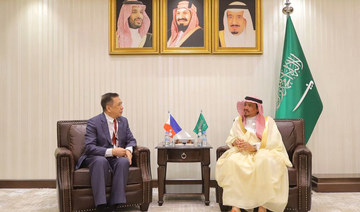LONDON: Rabbi Nicky Liss won’t be watching King Charles III’s coronation. He’ll be doing something he considers more important: praying for the monarch on the Jewish sabbath.
On Saturday, he will join rabbis across Britain in reading a prayer in English and Hebrew that gives thanks for the new king in the name of the “one God who created us all.”
Liss, the rabbi of Highgate Synagogue in north London, said British Jews appreciated Charles’ pledge to promote the co-existence of all faiths and his record of supporting a multifaith society during his long apprenticeship as heir to the throne.
“When he says he wants to be a defender of faiths, that means the world because our history hasn’t always been so simple and we haven’t always lived freely; we haven’t been able to practice our religion,” Liss told The Associated Press. “But knowing that King Charles acts this way and speaks this way is tremendously comforting.”
At a time when religion is fueling tensions around the world — from Hindu nationalists in India to Jewish settlers in the West Bank and fundamentalist Christians in the United States — Charles is trying to bridge the differences between the faith groups that make up Britain’s increasingly diverse society.
Achieving that goal is critical to the new king’s efforts to show that the monarchy, a 1,000-year-old institution with Christian roots, can still represent the people of modern, multicultural Britain.
But Charles, the supreme governor of the Church of England, faces a very different country than the one that adoringly celebrated his mother’s coronation in 1953.
Seventy years ago, more than 80 percent of the people of England were Christian, and the mass migration that would change the face of the nation was just beginning. That figure has now dropped below half, with 37 percent saying they have no religion, 6.5 percent calling themselves Muslim and 1.7 percent Hindu, according to the latest census figures. The change is even more pronounced in London, where more than a quarter of the population have a non-Christian faith.
Charles recognized that change long before he became king last September.
As far back as the 1990s, Charles suggested that he would like to be known as “the defender of faith,” a small but hugely symbolic change from the monarch’s traditional title of “defender of the faith,” meaning Christianity. It’s an important distinction for a man who believes in the healing power of yoga and once called Islam “one of the greatest treasuries of accumulated wisdom and spiritual knowledge available to humanity.”
The king’s commitment to diversity will be on display at his coronation, when religious leaders representing the Buddhist, Hindu, Jewish, Muslim and Sikh traditions will for the first time play an active role in the ceremonies.
“I have always thought of Britain as a ‘community of communities,’’’ Charles told faith leaders in September.
“That has led me to understand that the Sovereign has an additional duty — less formally recognized but to be no less diligently discharged. It is the duty to protect the diversity of our country, including by protecting the space for faith itself and its practice through the religions, cultures, traditions and beliefs to which our hearts and minds direct us as individuals.”
That’s not an easy task in a country where religious and cultural differences sometimes boil over.
Just last summer, Muslim and Hindu youths clashed in the city of Leicester. The main opposition Labour Party has struggled to rid itself of antisemitism, and the government’s counterterrorism strategy has been criticized for focusing on Muslims. Then there are the sectarian differences that still separate Catholics and Protestants in Northern Ireland.
Such tensions underscore the crucial need for Britain to have a head of state who personally works to promote inclusivity, said Farhan Nizami, director of the Oxford Center for Islamic Studies.
Charles has been the center’s patron for 30 years, lending his stature to Nizami’s effort to build an academic hub for studying all facets of the Islamic world, including history, science and literature, as well as religion. During those years, the center moved from a nondescript wooden structure to a complex that has its own library, conference facilities and a mosque complete with dome and minaret.
“It is very important that we have a king who has been consistently committed to (inclusivity),” Nizami said. “It is so relevant in the modern age, with all the mobility, with the difference and diversity that exists, that the head of this state should bring people together, both by example and action.”
Those actions are sometimes small. But they resonate with people like Balwinder Shukra, who saw the king a few months ago when he officially opened the Guru Nanak Gurdwara, a Sikh house of worship, in Luton, an ethnically diverse city of almost 300,000 north of London.
Shukra, 65, paused from patting out flatbreads known as chapatis for the communal meal the gurdwara serves to all comers, adjusted her floral shawl, and expressed her admiration for Charles’ decision to sit on the floor with other members of the congregation.
Referring to the Guru Granth Sahib, the Sikh holy book, Shukra said that “all the people (are) equal.’’ It “doesn’t matter” if you are king, she added.
Some British newspapers have suggested that Charles’ desire to include other faiths in the coronation faced resistance from the Church of England, and one conservative religious commentator recently warned that a multifaith ceremony could weaken the “kingly roots” of the monarchy.
But George Gross, who studies the link between religion and monarchy, dismissed these concerns.
The crowning of monarchs is a tradition that stretches back to the ancient Egyptians and Romans, so there is nothing intrinsically Christian about it, said Gross, a visiting research fellow at King’s College London. In addition, all of the central religious elements of the service will be conducted by Church of England clergy.
Representatives of other faiths have already been present at other major public events in Britain, such as the Remembrance Day services.
“These things are not unusual in more contemporary settings,” he said “So I think of it the other way: Were there not to be other representatives, it would seem very odd.”
Charles’ commitment to a multifaith society is also a symbol of the progress that’s been made in ending a rift in the Christian tradition that began in 1534, when Henry VIII broke away from the Catholic Church and declared himself head of the Church of England.
That split ushered in hundreds of years of tensions between Catholics and Anglicans that finally faded during the queen’s reign, said Cardinal Vincent Nichols, the most senior Catholic clergyman in England. Nichols will be in the Abbey when Charles is crowned on Saturday.
“I get lots of privileges,” he said cheerfully. “But this will be one of the greatest, I think, to play a part in the coronation of the monarch.”
Muslims, Jews, Sikhs get coronation role as King Charles reaches out
https://arab.news/bw3xn
Muslims, Jews, Sikhs get coronation role as King Charles reaches out
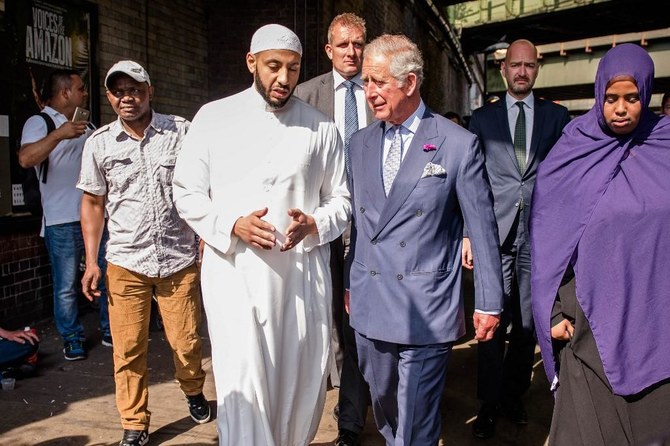
- “It is very important that we have a king who has been consistently committed to (inclusivity),” Nizami said
- Some British newspapers have suggested that Charles’ desire to include other faiths in the coronation faced resistance from the Church of England
Police aim to break up pro-Palestine protests in Amsterdam

- The Eindhoven University of Technology confirmed that there were “dozens of students peacefully protesting outside next to ten to 15 tents”
AMSTERDAM: Police moved in to end a pro-Palestinian protest at the University of Amsterdam on Monday after protesters occupied university buildings in various Dutch cities to condemn Israel’s war in Gaza, ANP news agency reported.
Earlier on Monday, a Dutch protest group said it had occupied university buildings in the Dutch cities of Amsterdam, Groningen and Eindhoven.
In a post on social media site X, Amsterdam police said the university had filed a police report against the protesters for acts of vandalism.
Police made sure no one entered the university buildings and asked protesters to leave the premises voluntarily.
A spokesperson for the University of Amsterdam confirmed the occupation and said it had advised people not affiliated with the protest to leave the building.
The Eindhoven University of Technology confirmed that there were “dozens of students peacefully protesting outside next to ten to 15 tents.”
Students in the Netherlands have been protesting against Israel’s war in Gaza since last Monday and Dutch riot police had previously clashed with protesters at the University of Amsterdam.
Students in the US and Europe have also been holding mostly peaceful demonstrations calling for an immediate permanent ceasefire and for schools to cut financial ties with companies they say are profiting from the oppression of Palestinians.
Ukraine’s first lady and foreign minister visit Russia-friendly Serbia

- Although Serbia has condemned the Russian aggression on Ukraine, it has refused to join international sanctions against Moscow
BELGRADE, Serbia: Ukrainian Foreign Minister Dmytro Kuleba made a surprise visit to Russia-friendly Serbia on Monday, together with Ukraine’s first lady, Olena Zelenska, in a sign of warming relations between the two states.
On his first visit to Serbia since the start of the Russian aggression on Ukraine in 2022, Kuleba met Serbian President Aleksandar Vucic and new Serbian Prime Minister Milos Vucevic, whose government includes several pro-Russian ministers, including two who have been under US sanctions.
A statement issued by the prime minister’s office after the talks said that “Serbia is committed to respecting international law and the territorial integrity of every member state of the United Nations, including Ukraine.”
Although Serbia has condemned the Russian aggression on Ukraine, it has refused to join international sanctions against Moscow and has instead maintained warm and friendly relations with its traditional Slavic ally.
Serbia has proclaimed neutrality regarding the war in Ukraine, and its authorities repeat that Serbia does not supply weapons to any parties. However, there are reports that Serbia has delivered weapons to Ukraine through intermediary countries. The visit by Kuleba and Zelenska, who toured the Serbian capital with Serbian first lady Tamara Vucic on Sunday, was met with criticism in Moscow. Comments by readers in the Russian state-run media such as “shameful” were published by RIA Novosti.
In what appears to be damage control, soon after his talks with Kuleba on Monday, Vucevic was to meet the Russian ambassador to Belgrade and the two were to tour a big storage facility for Russian gas that is being imported to Serbia.
Pro-Russian President Vucic has informally met Ukrainian President Volodymyr Zelenskyy three times on the sidelines of international conferences. Serbia has supplied Ukraine with humanitarian and financial aid.
Vucic has for years claimed to follow a “neutral” policy, balancing ties among Moscow, Beijing, Brussels and Washington. Although he has repeatedly said that Serbia is firm on its proclaimed goal of seeking European Union membership, under his authoritarian rule the Balkan country appears to be shifting closer to Russia and especially China.
During a high-stakes visit by Chinese President Xi Jinping to Belgrade last week, China and Serbia signed an agreement to build “ironclad” relations and a “shared joint future.”
Modi’s BJP skips Kashmir as Indian election enters fourth phase

- Millions of Indians across 96 constituencies began voting on Monday
- Ruling party is not fighting elections in Kashmir for first time in 30 years
NEW DELHI: India’s ruling Bharatiya Janata Party is not contesting elections in the Muslim-majority region of Kashmir for the first time in nearly three decades, as voting in the latest round of the national polls got underway on Monday.
The world’s most populous country began voting on April 19 in a seven-phase election that is scheduled to take place over six weeks, with ballots set to be counted on June 4.
India has 968 million people eligible to vote in the general election, where incumbent Prime Minister Narendra Modi and his Hindu nationalist BJP are aiming for a rare third consecutive term in power.
Monday’s voting involved 96 constituencies in the fourth round of polling.
While the BJP, which has been in power since 2014, and its allies are contesting every other part of India as they look to secure a majority of the 543 parliamentary seats, the party is sitting out in the northern Himalayan territory of Jammu and Kashmir.
This year marks the region’s first election since Modi’s government stripped the valley of its special autonomous status and statehood — which was granted by the Indian Constitution — on Aug. 5, 2019. The move unilaterally revoked the relevant provisions under Article 370, scrapping Kashmir’s flag, legislature, protections on land ownership and fundamental rights, sparking fears of demographic engineering in the region.
“It’s really surprising that the BJP, which claimed to have over 800,000 cadres in the valley, failed to find a single candidate. It shows that the BJP is not popular in the valley,” Sanjay Tickoo, the Srinagar-based leader of the Hindu minority group Kashmiri Pandit, told Arab News.
“I am expecting a record turnout to show the central government what (they) have done to the people of Jammu and Kashmir. This is the reflection of anger … no one is happy in the valley after the abrogation of Article 370.”
Indian-controlled Jammu and Kashmir is part of the larger Kashmiri territory, which has been the subject of international dispute since the 1947 partition of the Indian subcontinent into Hindu-majority India and Muslim-majority Pakistan. Both countries claim Kashmir in full and rule in part.
Modi said his government had been focusing on jobs and development as part of an effort to end violence in the valley, which has for decades witnessed outbreaks of separatist insurgencies to resist control from the government in New Delhi.
But after the BJP lost Kashmir’s three seats in the 2019 election, the party’s popularity slid further after it revoked the region’s autonomous status later the same year and subsequently imposed months of strict communication blockade and jailed hundreds of political leaders.
“The vote expresses not only anger but also apprehension against the anti-Muslim rants that have been going on as well as whatever they have done in Kashmir,” Professor Sheikh Showkat, a Srinagar-based political analyst, told Arab News.
Altaf Thakur, BJP spokesperson in Kashmir, said the party was still taking part in the Kashmir polls by supporting other regional parties.
“It is not correct to say that we are not fighting the election, we are playing the role of kingmaker and whichever way the cadres of the BJP will go, we will win,” he told Arab News.
“It’s not important whether we stand in the elections or not, the important thing is that we have to defeat the dynasty rulers,” he said, referring to the main contenders in the Kashmir polls, the National Conference and People’s Democratic Party.
While they are fighting each other in the valley, both parties have said they oppose the BJP and are part of the Congress party-led opposition alliance, known as India.
For some Kashmiri voters, Monday’s vote was about speaking up for themselves.
“The BJP knew that they cannot tolerate the wrath of the people of Kashmir. They fled the contest without a fight,” Aijaz Ahmed, a businessman from Srinagar, told Arab News.
“I voted today because it gave me an opportunity to express myself and tell the government in Delhi that you cannot keep us silenced. We want an atmosphere without fear and a region where our own identity is not questioned.”
5,000 Filipino pilgrims expected to fly to Makkah for Hajj

- Travelers ‘can expect VIP-like treatment,’ National Commission on Muslim Filipinos says
- First pilgrims will take off from Manila International Airport next week
MANILA: Thousands of Filipino pilgrims are set to travel to Makkah for the upcoming Hajj pilgrimage, the National Commission on Muslim Filipinos said on Monday, with the first batch set to leave for Saudi Arabia next week.
In the predominantly Catholic Philippines, Muslims constitute about 10 percent of the nearly 120 million population. Most live on the island of Mindanao and the Sulu archipelago in the country’s south, as well as in the central-western province of Palawan.
The commission said that nearly 5,000 Muslims had confirmed they would travel to Saudi Arabia to perform the Hajj pilgrimage this year.
“We have already processed 96 percent of the pilgrims,” Zainoden Usudan, chief of Hajj operations at the NCMF’s Bureau of Pilgrimage and Endowment, said.
“They can expect VIP-like treatment, allowing them to fully concentrate on their pilgrimage.”
Officials from the commission have been working hard to ensure that the difficulties faced by pilgrims last year will not be a problem this time around.
“This time, we are making sure that food will not be a problem,” Usudan said, referring to problems with delayed meal deliveries in 2023.
He said the commission was working with a service provider in the Kingdom that had contingency plans for all aspects of the trip, including transportation.
The first Hajj flight from the Philippines is set to take off from Manila International Airport on May 23.
One of the five pillars of Islam, this year’s Hajj is expected to run from June 14-19. Many pilgrims extend their stays to make the most of the once-in-a-lifetime opportunity to fulfill their religious duty.
Charities brand UK family reunion system for asylum-seekers ‘broken’

- New report says thousands waiting for relatives to be relocated to Britain
- Refugee Council CEO: ‘The UK has clearly failed the Afghan refugees that it promised to protect’
London: Charities in the UK have branded the country’s system for reuniting separated families of asylum-seekers “broken,” calling for the Home Office to “fix and expand” it.
A new report published by the Refugee Council and Safe Passage International has highlighted figures showing a backlog of more than 11,000 migrants in the UK waiting to be reunited with relatives during the summer last year.
Despite repeated freedom of information requests, the Home Office has not provided updated figures since then.
The report mentioned that a particular problem faces separated Afghan families, with many individuals reaching the UK but finding themselves in prolonged legal difficulty and their relatives forced to remain in Afghanistan, neighboring Pakistan or elsewhere.
Currently, Afghans evacuated from their country as part of Operation Pitting in August 2021 are prevented from automatically bringing close family to the UK.
In October 2023, the British government proposed a new system to address this issue, but the plan has yet to implemented despite pressure from MPs and members of the House of Lords.
Approved asylum-seekers can apply for a family reunification visa, but thousands find themselves stuck in a backlog of cases despite the Home Office saying the process should take under 12 weeks.
The Independent spoke to a number of Afghans, including a former pilot, struggling to be reunited with their relatives.
The pilot told the newspaper: “They (his family) have been waiting for a visa for five months in Iran, but so far there is no news from the embassy and there is no guarantee it will be issued.
“My family are facing a lot of problems. They don’t have a proper place to live, and don’t have access to a doctor, because they are living illegally.
“Their Iranian visas have expired and they need to extend them, but it is impossible. My wife is suffering mentally and emotionally, and she is completely (without hope).”
Another issue is that of unaccompanied children who, under current rules, also cannot use their status to automatically relocate their families to the UK.
The Independent spoke to one Afghan teenager, Farhad, rescued from Kabul without his parents in 2021, who faces an anxious wait to see if his family can join him in the UK.
“(The UK government) promised in 2021 that they’re going to bring the families, but it’s still been almost three years,” he said.
“My mum and my siblings are in Pakistan because they needed a doctor and medication. But my father couldn’t get the visa to go with them.
“I am doing my GCSEs this month and I can’t really focus on my studies knowing that my family is struggling.”
Safe Passage International highlighted the case of another young boy, Ahmad, who had tried to join his older brother in the UK.
Despite both his parents having died in Afghanistan, the Home Office denied that he had any “serious and compelling” circumstances to justify his asylum application.
He was only able to stay in the UK after a judge intervened, ordering the Home Office to provide assistance.
Safe Passage International’s CEO Dr. Wanda Wyporska told The Independent: “Nearly three years on, it’s a national shame that Afghans, who risked so much to support UK military operations, are still waiting for a way to bring their family to safety here with them. Their family members are living in fear every day of the Taliban.”
The Refugee Council’s CEO Enver Solomon said: “The UK has clearly failed the Afghan refugees that it promised to protect, by keeping families separated for so long with no information on how they may be reunited.
“After risking everything for the UK, Afghans and their families should not be forced to make dangerous boat journeys to get here, nor should they face hostile, inhumane policies like the Rwanda plan when they do make it to the UK.”
A Home Office spokesperson told The Independent: “We made one of the largest commitments of any country to support people from Afghanistan, and so far we have brought around 27,900 individuals to safety in the UK, including thousands under our Afghan resettlement schemes.
“In October we committed to establish a route for those evacuated from Afghanistan under Pathway 1 of the Afghan Citizens Resettlement Scheme without their immediate family members, to reunite them in the UK.
“We remain on track to meet that commitment and open the route for referrals in the first half of this year.”



